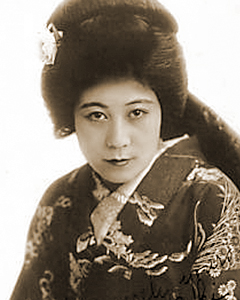
People active in the silent era and people who keep the silent era alive.
Copyright © 1999-2024 by Carl Bennett and the Silent Era Company.
All Rights Reserved.
|
|
 |
Photograph by Albert Walter Witzel;
Silent Era image collection.
|
Tsuru Aoki
Born 9 September 1892 in Tokyo, Japan.
Died 18 October 1961 in Tokyo, Japan, of acute peritonitis.
Married actor Sessue Hayakawa, 1 May 1914.
Perhaps the first Asian actress to appear in American cinema, lovers of silent cinema have forgotten the name Tsuru Aoki, whereas her husband, Sessue Hayakawa, remains a legend. Aoki’s film career in fact preceded her husband’s rise to fame in Cecil B. DeMille’s The Cheat (1915).
Aoki immigrated to the United States in 1903 with her aunt and uncle, Sado Yacco and Otto Kawakimi, who were owners of the Imperial Theatre of Japan. She was later adopted by another uncle, Hyosai Aoki, a wealthy artist who lived in San Francisco.
Aoki was already an established stage and screen actress in Los Angeles’ Japanese theatre when she and her future husband met in 1913. Aoki induced her employer, producer Thomas H. Ince, to attend a performance of the play The Typhoon in which Hayakawa was appearing. Impressed, Ince signed Hayakawa for a role in The Wrath of the Gods (1914), in which Aoki starred. After its success, Hayakawa headlined the screen version of The Typhoon (1914). Aoki and Hayakawa were married in May 1914. The couple later adopted two children.
Aoki starred for Ince/Kay Bee Pictures in her own series of films, but teamed with her husband whenever a suitable role was available. Alien Souls (1916), The Soul of Kura-San (1916), Each to His Kind (1917), His Birthright (1918), The Courageous Coward (1918), The Dragon Painter (1919), Black Roses (1921) and Five Days to Live (1921) were among the nearly twenty films in which they costarred.
As Aoki Tsuruko, she appeared in the Japanese film, Sakura no Hikari (1920).
In France, they made La bataille [The Danger Line] (1923). Aoki did not make a talkie in the United States until Hell to Eternity (1960), her final film and her last with Hayakawa.
— Biography by Joseph Worrell
References: Brownlow-Behind pp. 341-352 : Bodeen, DeWitt, “Sessue Hayakawa,” in Films in Review, Volume 27, April 1976 : Website-IMDb.
|





































